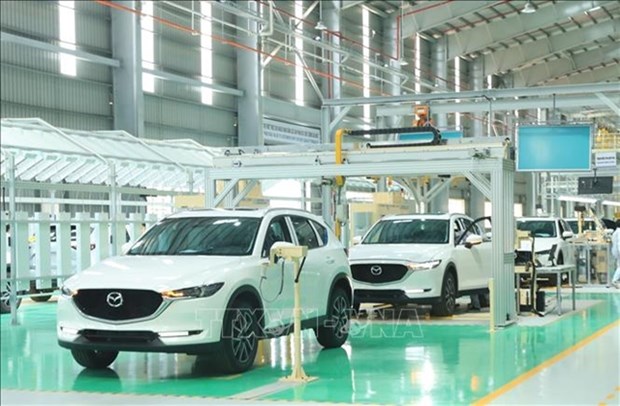Car sales rocket after registration fee cut
After the Government’s move to lower car registration fees by half took effect more than a week ago, the domestic car market has picked up.
 An auto assembly line at Truong Hai Auto Corporation at Chu Lai Open Economic Zone in Quang Nam province (Source: VNA)
An auto assembly line at Truong Hai Auto Corporation at Chu Lai Open Economic Zone in Quang Nam province (Source: VNA)Hanoi (VNS/VNA) - After the Government’s move to lower car registration fees by half took effect more than a week ago, the domestic car market has picked up.
Prime Minister Nguyen Xuan Phuc decided to cut 50 percent of registration fees for locally-manufactured and assembled cars till the end of this year. The reduction was proposed by the Ministry of Industry and Trade to help local businesses recover production and trade as well as stimulating consumption of cars.
Cars currently have a registration fee of 12 percent of the car value in Hanoi, and 10 percent in other cities and provinces nationwide.
Auto dealers said the number of car buyers had increased by some 20 percent.
In the Vietnamese automobile market, locally-assembled cars are priced at the lowest from 299 million VND (12,892 USD) for Kia Morning and up to 4.9 billion VND for Mercedes-Benz S 450 L Luxury.
For the cheapest Kia Morning priced at 299 million VND, with a registration fee from 10 to 12 percent, car buyers only need to pay 14.95 million VND to 17.94 million VND, instead of 29.9 million VND to 35.88 million VND as before.
For the best-selling cars in the Vietnamese auto market such as Toyota Vios priced from 470 million VND to 570 million VND or Hyundai Accent with 426 to 542 million VND, car buyers can save up to 34.2 million VND due to the registration fee cut.
Luxury car production and assembly in the country with high prices will benefit the most. In Vietnam, the only luxury car brand assembled in the country is Mercedes-Benz, with the most expensive model the S 450 L Luxury, priced from 4.2 to 4.9 billion VND. Registration fees were previously from 420 million VND to 596 million VND but now cost only from 210 million VND to 298 million VND.
Nguyen Thi Thuy, a car buyer in Hanoi’s Hoang Mai district told Vietnam News that she took advantage of the policy to buy a new car a few days ago.
“I planned to buy an old car due to a limited budget. However, I decided to buy a new one at the last minute thanks to the registration fee reduction. I saved some 40 million VND from the cut,” she added.
Some auto dealers in Hanoi said the policy has been warming up the market after a long stagnation due to the COVID-19 pandemic.
Dinh Van Trong, Director of Hyundai Dong Do, said the number of car transactions had increased by 30 to 40 percent against the time of the height of the pandemic. Small cars with prices of 500 to 600 million VND each had the highest sales. The market is receiving positive responses from the Government's stimulus policy while businesses also reduce the cost burden.
Nguyen Van Hau, a representative from Mazda Giai Phong, told Vietnam News that their car sales increased from 42 in May to 120 in June (up 300 percent) after the registration fee cut took effect. There were some 100 car buyers lodging deposits to buy cars before June 28 to enjoy the fee cut.
“We are offering 40-80 million VND off depending on kinds of cars on registration fees for customers. After June 28, the number of signed contracts waiting for car delivery was still high. We still have 80 cars that have not been delivered to customers who reserved due to a lack of supply,” he said.
He added that car demand at his dealership was higher than the supply, making them roll back some promotional programmes which were applied during the COVID-19.
In areas neighbouring Hanoi, car dealers' representatives also noted that the market for assembled cars had heated up, as opposed to imported cars. For example, Mitsubishi with six out of seven models imported cars, the number of transactions did not change significantly. Locally assembled car manufacturers had a sudden increase in the early days after the policy took effect.
Experts said car sales would continue to increase this month as many customers signed contracts before and would get their car later to enjoy the policy.
However, they said the registration fee cut only applies to domestically-assembled cars, so businesses need to balance their policies to avoid the situation of consumers turning their backs on local cars after the fee cut ends and waiting for imported ones./.













